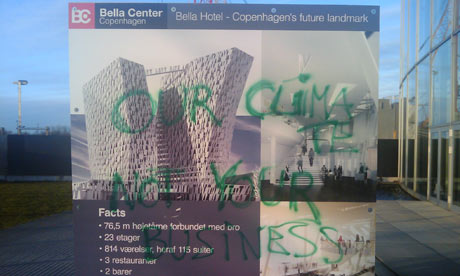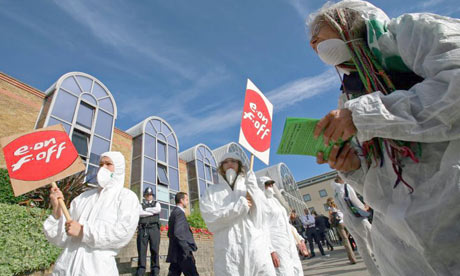With carbon cap-and-trade legislation now on Washington's agenda, companies and interest groups have been hiring lobbyists at a feverish pace, by Marianne Lavelle. From Yale Environment 360, part of Guardian Environment Network
Climate action advocates found the sign they had been waiting for in Summary Table 4 of President Obama's budget plan: The administration intends to place a price on carbon dioxide emissions that would cost fossil fuel industries $646 billion through 2019 — creating a new pot of federal money in the process.
That stark row of numbers also gave opponents of climate legislation what they had been waiting for: a call to arms. "The Obama budget did more to help us consolidate and coalesce the business community than anything we could have done," William Kovacs, who heads up regulatory affairs at the U.S. Chamber of Commerce, told The Wall Street Journal.
If the stage is now set for the climate battle to begin, there is no shortage of combatants. A Center for Public Integrity analysis shows that, by the end of last year, more than 770 companies and interest groups had hired an estimated 2,340 lobbyists to influence federal policy on climate change. That's an increase of more than 300 percent in just five years, and means that Washington can now boast more than four climate lobbyists for every member of Congress.
Some of the lobbyists, like those representing the U.S. Chamber, clearly are seeking to derail any federal effort to mandate a reduction in fossil fuel emissions. But others have more subtle agendas — they seek to blunt the costs, or tailor any new climate policy to their narrow agendas. Some just want a slice of that revenue stream. Others hope to shape the rules of the bazaar in the market-based system that the politicians, including Obama, favor for grappling with global warming.
So the growth in lobbyists signals not only a redoubling of efforts by the energy industry and manufacturers — who dominated the scene five years ago — but the addition of a slew of new interests, from the bankers on Wall Street to the officials running public transit on Main Street.
Some longtime climate action advocates welcome the newcomers to the party. They have a kind of Realpolitik rationale: As a practical matter, they believe support will build among the politicians as more interests like agriculture, financiers, builders, and even forward-looking manufacturers and power companies see what they could gain in a carbon-reduction regime.
Perhaps they're right. Maybe the "sum of all lobbies," as U.S. energy policy has been famously described, will this time add up to a positive for the planet. But there's more reason to fear that climate policy will die at the hands of special interests than there is to believe that special interests can bring climate policy to life.
Look at what happened to the climate bill sponsored last year by Connecticut Independent Joseph Lieberman and Virginia Republican John Warner.
With the legislation being debated last spring just as U.S. gasoline prices made their historic climb to more than $4 a gallon, the Chamber of Commerce and other business opponents focused on how climate policy would make the nation's favored fuels even costlier. The Chamber warned of job losses and economic hardship, with memorable ads featuring energy-starved Americans cooking eggs over candles and jogging to work on auto-free streets.
Proponents of climate legislation were able to summon economic studies — including from the government's own experts — challenging the grim predictions of the Chamber and others. But when push came to shove, the bill garnered only 48 votes, and nine of those came from the infamous "Gang of 10" Democrats who soon revealed they would have voted against the actual bill — all due to their concerns over the price for consumers and business. Remember, Lieberman estimated his bill only would have imposed $17 billion in costs on the fossil fuel industry in the first year. That key line in the Obama budget anticipates first-year climate revenue of $79 billion.
Dealing with blatant opponents is bad enough. But what about wavering climate action supporters? Jim Rogers, chief executive of Duke Energy, the nation's sixth-largest power producer, says he wants to see a climate bill this year. But he has been quick to criticize the Obama approach, because he says a slower transition is needed to protect consumers of the coal-dependent states in the Midwest and South.
Duke and other members of the U.S. Climate Action Partnership — a coalition of businesses and some environmental groups — favor the government giving carbon pollution allowances for free to local electric distribution companies like Duke in the early stages of the program. Rogers has been critical of the Obama approach, which is expected to require polluters to pay for the program through a government auction of all carbon dioxide emissions permits. Proponents of auctioning 100 percent of CO2 permits seek to avoid the pitfalls of the European system, which initially gave away many permits to power producers at no cost, resulting in windfalls for those companies. The U.S. auction would provide revenue for the federal government to fund programs to offset the increased energy costs to families, as well as to invest in development of clean energy.
Yet another position is being staked out by the Edison Electric Institute — a power industry group to which Duke also belongs — which argues that free allowances also should go to the so-called "merchant" generators of power, companies that sprung up due to state deregulation and are now responsible for nearly a third of the power consumed in the United States. The merchants don't serve local populations — as old-style utilities do — but sell their power to the highest bidder in the wholesale market. Local utilities would be required by state regulators to pass the value of free allowances to their ratepayers, but unregulated merchant generators could keep any financial windfall for themselves.
If it sounds like the power business is divided among itself, that's because it is. That's part of the reason that U.S. CAP never could reach agreement on whether to support Warner-Lieberman bill last year. Meanwhile, U.S. CAP's $870,000 in spending on climate lobbying last year paled next to the $9.95 million spent by the American Coalition for Clean Coal Electricity (ACCCE), a group of 48 coal mining, hauling and burning companies. (Duke, incidentally, is one of several companies that are members of both ACCCE and U.S. CAP. It's hard to tell the players in the game, even with a scorecard.)
ACCCE will undoubtedly be a major player in the battle to pass climate legislation, and the group advocates a cautious approach that some cap-and-trade advocates say would delay serious climate legislation for years. While the group claims to support a federal program to curb CO2 emissions, ACCCE opposed the Warner-Lieberman bill and says it will only back legislation that encourages a "robust utilization of coal." Since there's no technology available today that scrubs the carbon out of emissions from coal-fired power plants, what ACCCE is really seeking is a go-slow approach from Congress while the government invests in developing that technology. Warner-Lieberman, in ACCCE's view, went too far, too fast.
On the other end of the spectrum is the fast-growing renewable energy sector, which is fully devoted to adding the price of carbon pollution to every kilowatt generated from cheap coal competitors. Yet, put renewable energy interests together with the environmental groups — both lobbies have mushroomed in the past five years — and they are still outnumbered 8 to 1 by all other interests lobbying on climate.
Climate action advocates will be counting on winning some of those interests to their side. Cities, counties and public agencies, for instance, see an opportunity to plug into a new federal revenue stream. Growth of mass transit, for example, could help get cars — and their carbon emissions — off the road. But would-be grant recipients want as few strings attached as possible, meaning fewer assurances that the money will actually be invested in projects that reduce greenhouse gas emissions.
And take agriculture. It is a hotly disputed subject, but some argue farmers could contribute to the climate solution through improved soil and manure handling practices. Projects to retain carbon in the soil or capture methane from manure are costly, but what if farmers could earn "credits" that they could later sell to coal-fired power companies that have trouble reducing their carbon dioxide emissions? Would these so-called "offsets" be enough to offset the agriculture interests' worries over rising fuel costs? Last year, the American Farm Bureau Federation was originally neutral on the Warner-Lieberman bill, then opposed it when offset opportunities were reduced in later amendments.
Shaping a climate policy to satisfy a variety of narrow interests has obvious perils. And the number of parties interested in influencing climate legislation seems to grow by the day. Wall Street banks and other financial players, for example, had virtually no presence on climate change on Capitol Hill five years ago. But by 2008 they had 130 lobbyists — as many as the alternative energy companies. Wall Street interests see themselves as brokers, project developers, financers and consultants in an emissions "permit" market that one federal regulator estimates could reach $2 trillion in value within five years, making carbon the world's most widely traded commodity.
Among the group of financial climate lobbyists last year was now-serial federal bailout recipient American International Group, which aimed to make investments around the globe in carbon-reduction projects. AIG was forced by public outcry to stop lobbying last fall soon after its first infusion of federal dollars, and the company recently withdrew from the U.S. Climate Action Partnership. But there are plenty of other potential carbon marketers looking to weigh in on policy, and oversight of their dealings is sure to be a sticking point — complicating or delaying the already difficult task of crafting a program to tackle global warming.
Former Senator Tim Wirth, president of the Ted Turner-funded UN Foundation — which has been working to promote global progress on climate — is worried. Public policy-making, he says, is by its nature incremental. But as climate scientists deliver ever-more urgent warnings about the rapid pace of warming, Wirth is increasingly convinced that radical action is needed.
"The money that will go into complicating this issue and casting doubt on this issue is going to be increasing as rapidly as the science," he says. "There will be more and more interests weighing in on behalf of doing little, or even taking the incremental steps that you'd expect policymakers to take. And it's exceedingly dangerous."
Negotiations for a new global climate treaty, of course, can go forward just as they have for years, without any clear signal of what sort of commitment the United States is willing to make to cut carbon emissions. But there's no chance of a deal that can make a difference to the planet without the U.S. on board. And that's going to take a feat of political leadership that keeps the interest of solving the climate crisis in the forefront, while leaving the special interests behind.
• From Yale Environment 360, part of Guardian Environment Network





